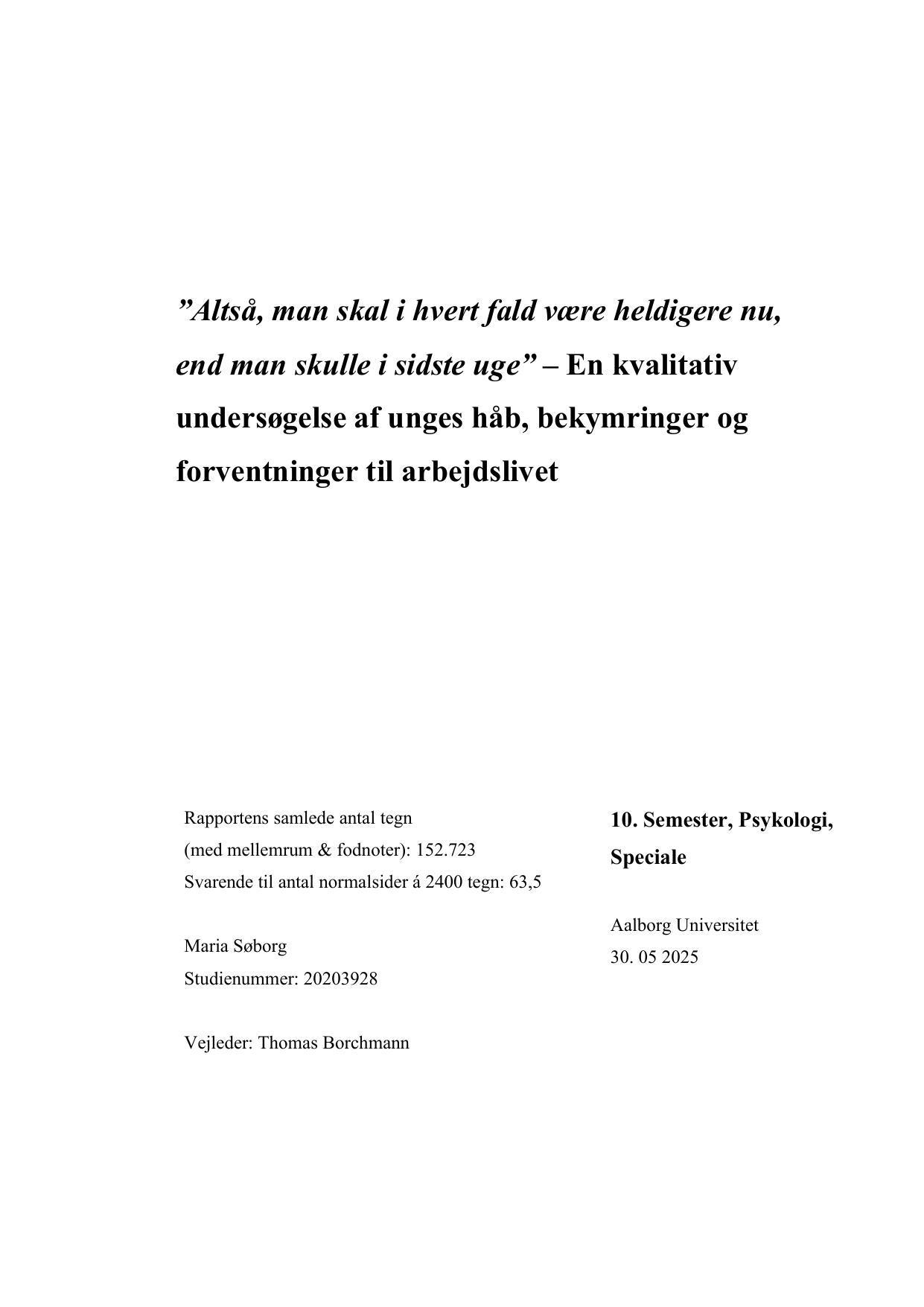
"Altså, man skal i hvert fald være heldigere nu, end man skulle i sidste uge" - En kvalitativ undersøgelse af unges håb, bekymringer og forventninger til arbejdslivet
Oversat titel
A qualitative study of young people's hopes, worries, and expectations for working life
Forfatter
Semester
4. semester
Uddannelse
Udgivelsesår
2025
Afleveret
2025-05-28
Antal sider
63
Abstract
This thesis explores what young people think and feel about starting work after finishing their education. It focuses on their hopes, worries, and expectations about working life. The transition from education to working life is a big change and can feel existential. While the transition is universal, this study aims to explore what characterizes the current generation of young adults – Generation Z – in their out-look on their future working life and the labor market. The thesis presents a theoretical framework that explores the nature of work and how it has evolved over time. Historically work was primarily linked to necessity and survival. In contrast, nowadays work increasingly involves the pursuit of meaning and identity. The thesis highlights how modern workers face emerging challenges such as automation, increased flexibility, and work intensification. These are developments that have contributed to more stressful and precarious employment conditions. These shifts in the labor market have made the transition from education to employment both longer and more uncertain, particularly for newly graduated academics like the five participants interviewed in this study. At the same time, Generation Z is characterized by internalized values and ideals that are often impossible to attain. This creates significant internal pressure and places young people at great-er risk of feeling inadequate, regardless of their achievements. The analysis reveals that young people hold a range of ambivalent expectations about their future working lives. On one hand, they express hopes of making a difference, being part of a workplace community, and gaining good professional and personal development opportunities. On the other hand, they struggle with concerns about becoming unemployed or trapped in a boring and meaningless job with poor colleagues and management. Their expectations for working life and themselves are also marked by uncertainty about their ability to perform and live up to both person-al and external demands. The thesis concludes that there is a need for more focused support in facilitating the transition from education to the labor market. This includes addressing the polit-ical and educational structures that influence young people’s opportunities, as well as the expectations they face in the world of work. A more nuanced understanding is needed of what young people need when entering the labor market to thrive and build a good working life in the long term.
This thesis explores what young people think and feel about starting work after finishing their education. It focuses on their hopes, worries, and expectations about working life. The transition from education to working life is a big change and can feel existential. While the transition is universal, this study aims to explore what characterizes the current generation of young adults – Generation Z – in their out-look on their future working life and the labor market. The thesis presents a theoretical framework that explores the nature of work and how it has evolved over time. Historically work was primarily linked to necessity and survival. In contrast, nowadays work increasingly involves the pursuit of meaning and identity. The thesis highlights how modern workers face emerging challenges such as automation, increased flexibility, and work intensification. These are developments that have contributed to more stressful and precarious employment conditions. These shifts in the labor market have made the transition from education to employment both longer and more uncertain, particularly for newly graduated academics like the five participants interviewed in this study. At the same time, Generation Z is characterized by internalized values and ideals that are often impossible to attain. This creates significant internal pressure and places young people at great-er risk of feeling inadequate, regardless of their achievements. The analysis reveals that young people hold a range of ambivalent expectations about their future working lives. On one hand, they express hopes of making a difference, being part of a workplace community, and gaining good professional and personal development opportunities. On the other hand, they struggle with concerns about becoming unemployed or trapped in a boring and meaningless job with poor colleagues and management. Their expectations for working life and themselves are also marked by uncertainty about their ability to perform and live up to both person-al and external demands. The thesis concludes that there is a need for more focused support in facilitating the transition from education to the labor market. This includes addressing the polit-ical and educational structures that influence young people’s opportunities, as well as the expectations they face in the world of work. A more nuanced understanding is needed of what young people need when entering the labor market to thrive and build a good working life in the long term.
Emneord
